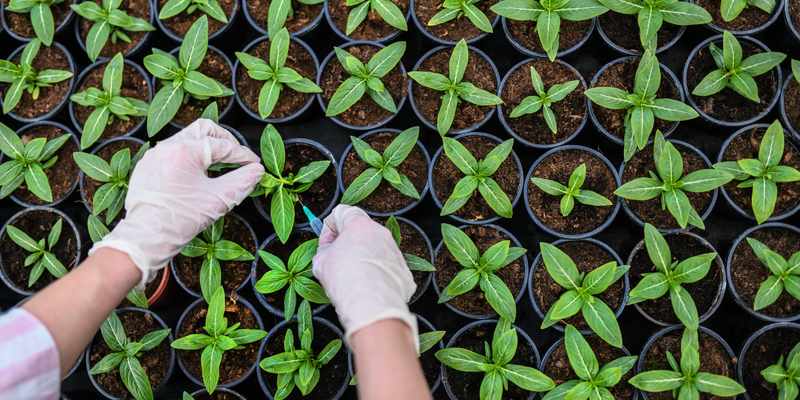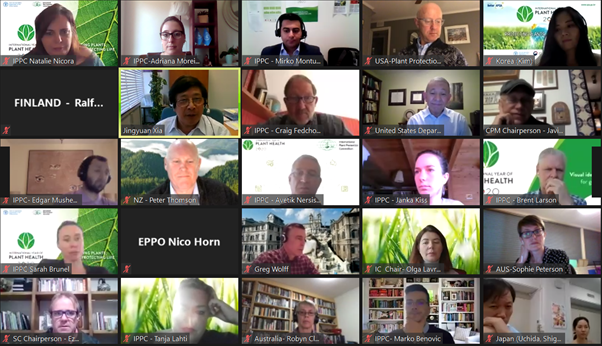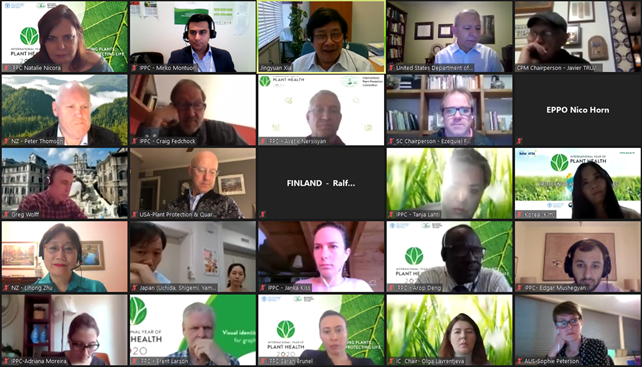Setting new global plant health priorities: the agenda of the Strategic Planning Group for the next decade
Posted on Tue, 13 Oct 2020, 12:05

Rome, 9 October 2020 – The IPPC Strategic Planning Group (SPG) met on Thursday 8 and Friday 9 October to discuss new global priorities and challenges in plant health. During his opening remarks, Mr Jingyuan Xia, Director of the FAO Plant Protection and Production Division, stressed the importance of aligning IPPC activities to the new Strategic Framework 2020-2030 and its identified pillars: standard setting, implementation and capacity development, and communication and partnerships.
Noting the impact of COVID-19 on the IPPC work programme as well as the increasing influence of digital transformation on economies and businesses, the SPG decided to prioritize the IPPC work on those development agenda items and activities, such as ePhyto, e-commerce, and commodity and pathway specific standards, that have proven to deliver significant value to contracting parties and that will help them better adapt to the new global context.
“The work on commodity and pathway standards presents a new direction for the IPPC during such unprecedent and challenging time”, highlighted by Mr Avetik Nersisyan, IPPC Standard Setting Unit Lead. The development of commodity standards, with harmonized phytosanitary measures, will help ensure global food security and facilitate safe trade in plant and other agricultural products. Similarly, the harmonization of electronic data exchange has been an excellent approach for countries to effectively exchange phytosanitary certificates during the pandemic.
As more countries start exchanging electronic phytosanitary certificates, the need to discuss sustainable funding and governance arrangements around the IPPC ePhyto Solution becomes more crucial. To that hand, the SPG decided to establish an ad hoc working group to consider best approaches and financial sustainability options for ePhyto. Similarly, the SPG fully supported the IPPC activities related to e-Commerce and recognized the importance of exploring new options to improve collaboration with e-Commerce stakeholders, particularly postal and express delivery services, and ensuring that online trade of plants and plant products comply with phytosanitary regulations.
The mitigation of the climate change impact on plant health was also recognized as one of the major challenges of the global plant health community for the next decade. The SPG agreed on the need to raise awareness of the phytosanitary implications of climate change and recommended to the 15th session of the Commission on Phytosanitary Measures (CPM-15) to establish a task force devoted to this topic. Global phytosanitary research coordination, diagnostic laboratory networks, pest outbreak alert and response system, the development of guidance on the use of third-party entities to perform specific phytosanitary actions, updates on the International Year of Plant Health (IYPH) were also discussed during the meeting.
Being communication and partnerships one of three pillars of the new IPPC Strategic Framework 2020-2030, the SPG was invited to note and endorse communication and partnerships strategies for CPM-15 further adoption. SPG members fully supported the development of a new communication strategy to be aligned with the new strategic framework and proposed the establishment of an IPPC communication advisory group. The function of the SPG itself and the positioning of the IPPC within the new FAO structure were further strategic topics addressed during the SPG discussion.
The report of this SPG meeting will be available at the following link:
https://www.ippc.int/en/core-activities/governance/strategic-planning-group/



